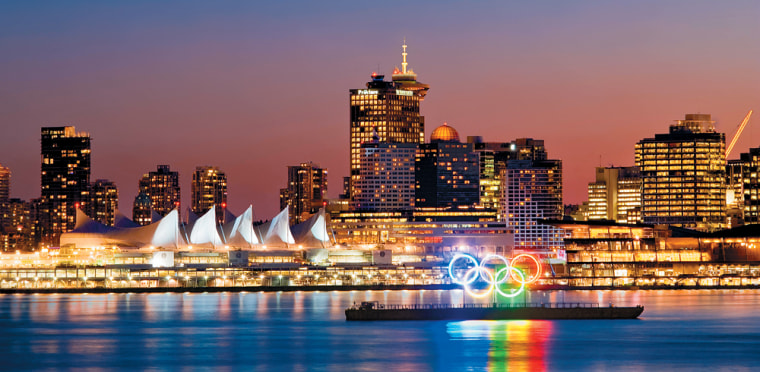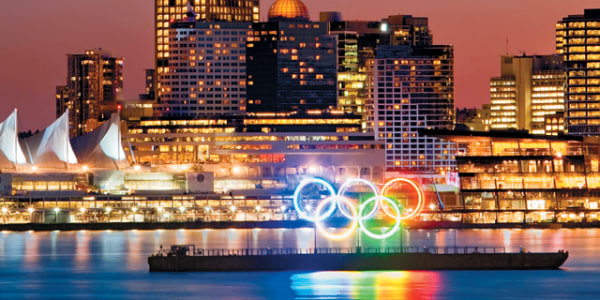The XXI Olympic Winter Games are expected to draw 5,500 athletes and officials, 250,000 spectators and enough sponsors, protesters and media types to create a 17-day whirlwind of sports, entertainment and headlines.
Its been nearly seven years since Vancouver won the bid for the 2010 Winter Olympics, 12 years since the Canadian Olympic Committee selected the city to present that bid and 24 years since the city hosted anything this monumental.
“Expo 86 was our coming out … the Olympics are our coming of age,” said Emily Armstrong, spokesperson for Tourism Vancouver.
With just over three weeks to go, inquiring minds want to know: Is Vancouver ready for its close-up?
Flanked by the Fraser River and Coast Mountains, the city has always been a cosmopolitan, Pacific Rim outpost surrounded by the natural splendor of British Columbia. The eighth largest city in the country (2006 pop.: 578,000), it’s also the largest metropolitan area (2.1 million) to ever host the Winter Games.
The Games themselves — February 12–28 — cover even more ground, with events taking place from the suburbs south of downtown (curling and speed skating) to the mountains above “West Van” (snowboarding and freestyle skiing) to the slopes and trails of Whistler and the nearby Callaghan Valley (alpine skiing, cross-country skiing, jumping, bobsleigh, etc.), 125 kilometers north of the city. (For a complete list of venues, click here.)
‘It’s been exausting’
Such a massive undertaking doesn’t come cheap. According to the Vancouver Organizing Committee (VANOC), the price tag for building and renovating venues, originally estimated at $470 million, will be more like $580 million (all funds in Canadian dollars). VANOC’s operating budget, meanwhile, has ballooned from a projected $1.35 billion five years ago to an estimated $1.76 billion.
And those costs don’t even include skyrocketing security costs — original estimate: $175 million; current estimate: $900 million — or the price tags of non-Games-specific infrastructure. Among the big-ticket items: improvements to the Sea to Sky Highway between Vancouver and Whistler ($600 million), an expanded convention center ($1 billion) and a new rapid-transit link between the Vancouver airport, Richmond and downtown ($1.2 billion).
Such improvements will prove a boon to visitors, but local residents have borne the brunt of the build-up. “It’s been two years of construction,” said longtime local reporter Frances Bula. “We’ve basically had to cross the Berlin Wall to get to the other side of town. It’s been exhausting.”
Slideshow 25 photos
Vancouver, B.C., 2010
Construction issues and cost-overruns aside, the city and surrounding areas are in high gear for the Games. The venues have been competition-tested; the countdown clock outside the Vancouver Art Gallery is down to double digits, and the night sky is lit by a 42-foot-high set of Olympic Rings perched on a barge floating just off the downtown waterfront.
“After the rings go up, you start to feel more like an Olympic host city,” Armstrong said.
A long road for fans
For visitors, especially Americans who thought the Olympics’ proximity would spell easy access, the road to the Games has had its share of bumps. “We’ve always watched them on TV, but they’re so close we figured it was a great opportunity to see them in person,” said Jim Jeffreys, a high school administrator in Seattle, who started planning an Olympics visit with his wife and son 18 months ago. “We had no idea it would be so complicated to get tickets and find a place to stay.”
Ticketing was especially nightmarish due to the combination of high demand, limited supply and an exclusive vendor with a penchant for high mark-ups, system crashes and little or no customer service. “We requested tickets for 10 to 12 events and got three,” Jeffreys said, who did better than many. With less than 100,000 tickets available to U.S. fans (out of 1.6 million total), many would-be spectators got completely skunked.
Lodging presented another challenge as more than half of greater Vancouver’s 25,000 hotel rooms were reserved for Olympic officials and national delegations. Those that weren’t were either scattered in distant suburbs or exorbitantly priced — or both. “We found one rundown hotel in Burnaby,” Jeffreys said. “It wasn’t near any of the venues and they wanted $850 a night.”
It’s a bit of a surprise then that there are still tickets and rooms to be had. On the ticketing front, VANOC has implemented a “fan-to-fan marketplace,” a first-of-its-kind online bazaar on which ticket-holders can sell unwanted tickets. Not surprisingly, most tickets are being offered at prices far above face value, but there's a good chance prices will soften as the opening ceremonies approach.
And there are still rooms available in both Vancouver and Whistler. In Vancouver, they range from hostels and B&Bs to the Norwegian Star, a cruise ship docked in North Vancouver. In Whistler, groups of four or more can still squeeze into condos for less than $200 per person per night. “There’s definitely a premium for the Games,” said Breton Murphy, spokesperson for Tourism Whistler,” but there’s still some good value.”
The key, Jeffreys suggested, is perseverance, along with recognizing that the Winter Olympics may never come this way again and biting the bullet regarding the process and high prices. “It’s been crazy, but we’ve passed the stressful part of it. Now, we’re just excited about what’s to come.”
Sports, celebrations and simmering issues
In Vancouver, the buzz is already palpable. Two weeks ago, the city began hanging the first of 6,000 Olympic lamp-post banners and people throughout the city are sporting red mittens — likely to become the Games’ hot accessory — as a show of support for Canadian athletes. As usual, Whistler has been abuzz ever since they fired up the lifts back in November.
The athletic competitions, of course, are the big draw, but even visitors without event tickets will find a lot to do, much of it for free. In Vancouver, the city is hosting LiveCity Vancouver, which will feature live concerts, Olympic programming on large LED screens and Provincial and sponsor pavilions at two outdoor celebration sites. A First Nations Pavilion (outside the Queen Elizabeth Theatre) and an outdoor ice-skating rink in Robson Square should also draw big crowds.
Whistler, too, will be hopping with Whistler Live!, which will feature live concerts, DJ beats, street performers and family entertainment at six sites around the village. Free programming will run from 9 a.m. to 11 p.m. throughout the Games — even on days when there are no scheduled competitions in town.
Amid the festivities, however, not everybody will be celebrating the Games — especially in Vancouver. Alongside its vibrant culture and gorgeous surroundings, the city suffers from a host of urban ills, including chronic homelessness and serious drug addiction — issues that activists believe have been shunted aside or swept under the rug as the Games have gathered momentum.
Add in issues of free speech, native rights and the debate over hosting the Games at all and displays of civil disobedience are all but guaranteed. “Vancouver’s famous for it,” Bula said. “It’s a cultural tradition here and a way for people to show they’re not going to live by VANOC’s rules.”
Let the Games begin
Meantime, pre-Games planning continues apace.
- In Whistler, construction crews are building temporary stadiums at outdoor venues and putting the finishing touches on the resort’s Medals Plaza.
- In Vancouver, streets are being closed — there’s no parking near any of the events during the Games — and fencing is being erected to secure venues and handle the expected crowds.
It’s all part of an effort that VANOC CEO John Furlong has likened to “staging three Super Bowls a day for 17 days.” It’s a massive undertaking, and there will likely be some bumps during the festivities — check nbcolympics.com’s Olympic coverage often for updates — but at this point, all but the most ardent critics are ready for the Games to begin.
As for travelers heading to Vancouver in coming weeks, the Games will provide an unprecedented opportunity to experience one of the world’s great destinations. “It’s the whole Olympic experience,” said Armstrong. “Yes, it’s about sports, but there’s so much more going on.”
Rob Lovitt is a frequent contributor to msnbc.com. If you'd like to respond to one of his columns or suggest a story idea, .

